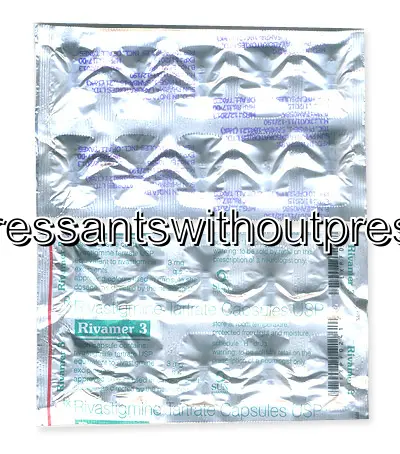| Package | Dosage | Price | Price per Dose | |
|---|---|---|---|---|
| Dosage: 1,5mg | ||||
| 360 pill | 1,5mg | €424.56 | €1.18 | |
| 240 pill | 1,5mg | €288.97 | €1.21 | |
| 180 pill | 1,5mg | €221.86 | €1.23 | |
| 120 pill | 1,5mg | €156.12 | €1.30 | |
| 90 pill | 1,5mg | €121.88 | €1.36 | |
| 60 pill | 1,5mg | €82.16 | €1.37 | |
| 30 pill | 1,5mg | €43.81 | €1.45 | |
| Dosage: 3mg | ||||
| 360 pill | 3mg | €388.95 | €1.08 | |
| 240 pill | 3mg | €272.53 | €1.14 | |
| 180 pill | 3mg | €212.27 | €1.18 | |
| 120 pill | 3mg | €153.38 | €1.27 | |
| 90 pill | 3mg | €121.88 | €1.36 | |
| 60 pill | 3mg | €89.01 | €1.48 | |
| 30 pill | 3mg | €50.66 | €1.68 | |

Rivastigmine Tartrate Description
Introduction to Rivastigmine Tartrate
Rivastigmine Tartrate is a widely used medication primarily prescribed for the management of Alzheimer's disease and Parkinson's disease-related dementia. It belongs to a class of drugs known as cholinesterase inhibitors. These medications work by preventing the breakdown of a neurotransmitter called acetylcholine, which is essential for memory and cognitive functions. By increasing acetylcholine levels in the brain, Rivastigmine Tartrate aims to improve mental clarity and daily functioning in affected individuals.
Effectiveness and Benefits
Many patients and healthcare providers have reported that Rivastigmine Tartrate can provide noticeable improvements in cognitive symptoms. It often helps in maintaining mental alertness, enhancing memory, and reducing confusion. Patients with early to moderate stages of dementia are typically good candidates for this medication. While it does not cure the underlying disease, it may slow the progression of symptoms and improve the quality of life. The medication can also contribute to better mood and behavioral stability in some users.
Administration and Dosage
Rivastigmine Tartrate is usually available in capsule, transdermal patch, and oral solution forms. The prescribed dosage depends on the patient's medical condition, age, and response to treatment. It is important to follow the healthcare provider’s instructions carefully. Typically, therapy starts with a low dose to minimize side effects, gradually increasing to the effective dose. The transdermal patch is often preferred for ease of use and to reduce gastrointestinal side effects associated with oral intake.
Possible Side Effects and Risks
Like all medications, Rivastigmine Tartrate can cause side effects. The most common include nausea, vomiting, diarrhea, dizziness, and fatigue. Some users may experience loss of appetite or weight loss. Less frequently, individuals might encounter sleep disturbances or allergic skin reactions, especially with the patch form. It is essential to report any severe or persistent side effects to a healthcare professional. In rare cases, the medication might increase the risk of heart-related issues or gastrointestinal bleeding, particularly in vulnerable populations.
Precautions and Interactions
Before starting Rivastigmine Tartrate, patients should disclose their full medical history, including liver problems, heart conditions, or gastrointestinal issues. It is also critical to inform the doctor about other medications, as Rivastigmine can interact with drugs such as antihistamines, other cholinesterase inhibitors, or anticholinergic agents. Such interactions might either diminish the drug's effectiveness or increase the risk of adverse reactions. Regular monitoring and communication with a healthcare provider are important to ensure safe use.
Conclusion
Rivastigmine Tartrate is regarded as an effective option for managing symptoms of dementia, providing cognitive support and helping patients maintain their independence for longer. Its different formulations allow flexibility in administration, which can improve patient adherence. However, like all medications, it requires careful management to balance benefits with potential side effects. Proper medical supervision is key to maximizing its therapeutic potential while minimizing risks.